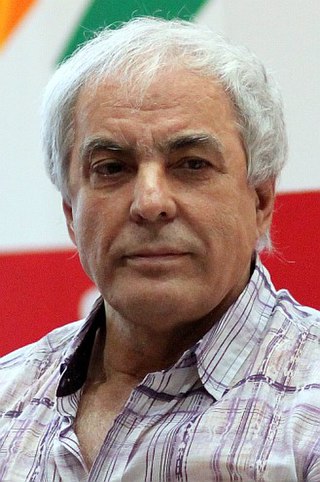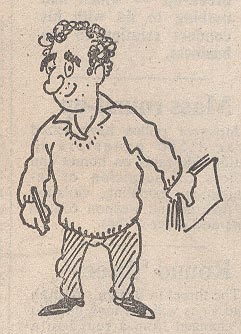Related Research Articles

A pen name or nom-de-plume is a pseudonym adopted by an author and printed on the title page or by-line of their works in place of their real name.
John William Jakes was an American writer, best known for historical and speculative fiction. His American Civil War trilogy, North and South, has sold millions of copies worldwide. He was also the author of The Kent Family Chronicles. Jakes used the pen name Jay Scotland among others.
A wagon train is a group of wagons traveling together. Before the extensive use of military vehicles, baggage trains followed an army with supplies and ammunition.
The Longarm books were a series of western novels featuring the character of Custis Long, who is nicknamed Longarm, a U.S. Deputy Marshal based in Denver, Colorado in the 1880s. The series was written by "Tabor Evans", a house pseudonym used by a number of authors at Jove Books. Lou Cameron helped create the character and wrote a number of the early books in the series. The first book was published in 1978 and new ones were added at a rate of approximately one a month through 2015. In addition to the regular series, there was a series of "giant editions" which were longer novels.

Western fiction is a genre of literature set in the American Old West frontier and typically set from the late eighteenth to the late nineteenth century. Well-known writers of Western fiction include Zane Grey from the early 20th century and Louis L'Amour from the mid-20th century. The genre peaked around the early 1960s, largely due to the popularity of televised Westerns such as Bonanza. Readership began to drop off in the mid- to late 1970s and reached a new low in the 2000s. Most bookstores, outside a few west American states, only carry a small number of Western fiction books.
James Luceno is an American author, known for his novels and reference books connected with the Star Wars franchise and the Star Wars Expanded Universe, and novelizations of the Robotech animated television series. Luceno is also the author of several original novels along with film novelizations and other franchise tie-ins. He has also written for television cartoon series.

Yuri Aleksandrovich Nikitin is a Russian writer of science fiction, historical fiction, and Slavic fantasy.
Harry Whittington was an American mystery novelist and one of the pioneers of the paperback novel. Born in Ocala, Florida, he worked in government jobs before becoming a writer. His reputation as a prolific writer of pulp fiction novels is supported by his writing of 85 novels in a span of twelve years mostly in the crime, suspense, hardboiled, and noir fiction genres. In total, he published over 200 novels. Seven of his writings were produced for the screen, including the television series Lawman (1958-1962). His reputation as 'The King of the Pulps' is shared with author H. Bedford-Jones. Eight of Whittington's hardboiled noir novels were republished by Stark House Press.
Robert Edward Vardeman is an American science fiction fan and writer.
Jon Sharpe was the original author of The Trailsman series of Western novels. The century series, which has run since the early 1980s, was created by author Jon Messmann, who wrote most of the first 200 books in the series under the Jon Sharpe pseudonym until his retirement in the late 1990s.

John Harris was a British novelist. He published a series of crime novels featuring the character Inspector Pel, and war books. He wrote with his own name, and also with the pseudonyms of Mark Hebden and Max Hennessy. His 1953 novel The Sea Shall Not Have Them was the basis for a feature film of the same name in 1954. He was the father of Juliet Harris, who published more Inspector Pel books under the name of Juliet Hebden.
John Henry Reese was an American author, mainly of Western and Crime Fiction. He won the prestigious 1952 New York Herald Tribune award for his first children's book, Big Mutt. He produced more than 40 Western novels and more than three hundred short stories. His first novel Sheehan's Mill, not of the Western genre, was published by Doubleday in 1943, during wartime publishing restrictions.
William Everett Cook, was a western writer who used the pen names Will Cook,James Keene,Wade Everett and Frank Peace. Called "a master western storyteller," Cook published dozens of short stories and 50 novels before his death at age 42. A number of his stories and novels were turned into Hollywood westerns, including the 1961 John Ford film Two Rode Together.
Wade Everett was the pseudonym used by the author Will Cook for some of his western novels. After Cook died in 1964, his Everett byline had become valuable enough that Ballantine Books turned it into a house name for novels written by other authors, including Giles A. Lutz.
Richard Edward Wormser was an American writer of pulp fiction, detective fiction, screenplays, and Westerns, some of it written using the pseudonym of Ed Friend. He is estimated to have written 300 short stories, 200 novelettes, 12 books, many screenplays, and stories turned into screenplays, and a cookbook: Southwest Cookery or At Home on the Range.
Lou Cameron was an American writer and a comic book artist.
Noel Bertram Gerson (1913–1988) was an American author who wrote 325 books, including several best sellers, among them two screenplay novelizations penned under the pseudonym Samuel Edwards, The Naked Maja, and 55 Days at Peking.
Dwight Bennett Newton was an American writer of westerns. He also wrote under the names Dwight Bennett, Clement Hardin, Ford Logan, Hank Mitchum and Dan Temple. Newton was one of the six founder members of the Western Writers of America. He was a writer and story consultant for various television shows including Wagon Train and Tales of Wells Fargo.
Richard Clay Reynolds was a Texan novelist, essayist, book critic and English professor. Author of more than 10 books of fiction, five books of nonfiction, hundreds of published essays and 1000+ critical book reviews, he lived and taught at universities in Texas and elsewhere.
Lyle Kenyon Engel was an American magazine publisher and book producer. Taking over the family business after his father's death, Engel made the company the largest publisher of lyric magazines in the country. He later founded Book Creations, Inc., which became one of the most successful "fiction factories" in the United States, hiring writers to write books to Engel's outlines which he sold to paperback publishers. Engel's most successful series was The Kent Family Chronicles by John Jakes.
References
- 1 2 3 Weiss, Brett, The Writer, (May 2011), "James Reasoner", Gale's Literature Resource Center.Web
- 1 2 3 Birns, Margaret (January 2007), Guide to Literary Masters and Their Works, EBSCOhost.Web
- 1 2 3 Fuller, Amy, Editor (2010) Gales Contemporary Authors, Volume 289. ISBN 978-1-4144-3954-9
- ↑ Hawk, Pat (1995). Hawk's Author's Pseudonyms II. ISBN 0-9643-1851-2
- ↑ Publishers Weekly (October 9, 2000), "James Reasoner's Civil War Battle", Gale's Literature Resource Center.Web
- ↑ "James Reasoner's Bibliography". Official Website. Archived from the original on 2013-09-22. Retrieved 2013-09-30.